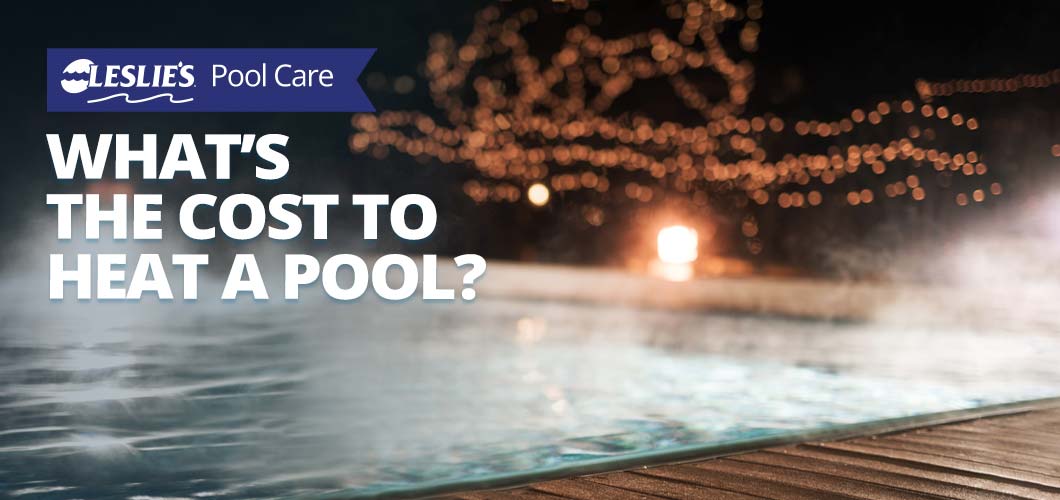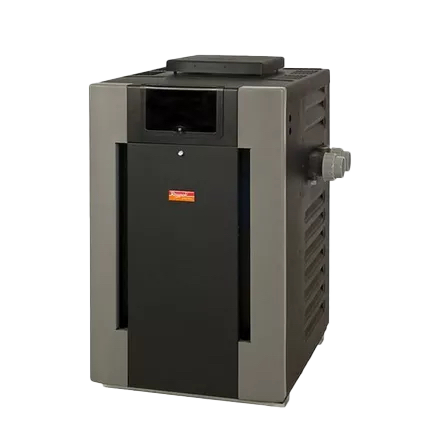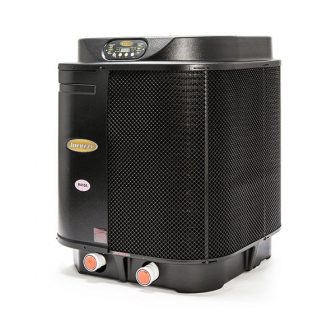
What’s the Cost to Heat a Pool?
If you're not ready for pool season to be over and still want to squeeze in a few more cannonballs, installing a pool heater is the way to go! Heating your pool will extend the swim season and keep your pool at the perfect temperature, even when it's cold outside. But what is the cost to heat a pool? Well, that answer depends on the type of heater you choose. In this post, we will discuss the different types of pool heaters, and the costs associated with each one.
Cost to Heat a Pool with a Gas Heater
One of the most popular ways to heat your pool is with a natural gas or propane gas heater, due to their rapid heating ability. Natural gas heaters hook up to your home's main gas line, while propane gas heaters get their fuel from a standalone propane tank. Using natural gas is typically less expensive than propane. However, not every home has easy access to a natural gas line.
The cost to heat a pool with a propane or natural gas heater depends on your fuel source and the surface area of your pool. The surface area of your pool determines the minimum BTU rating needed for your heater to properly heat your pool water. BTU, short for British Thermal Unit, is a unit of measurement that indicates how many pounds of water can be heated by 1ºF in one hour. Check out our blog post, How to Size a Pool Heater, to calculate the surface area of your pool and determine the minimum BTU requirement for your pool.
Purchase Price & Monthly Cost for a Natural Gas Heater
Leslie's offers a wide range of natural gas heaters from Hayward, Raypak, Pentair, and Jacuzzi. The purchase cost of a natural gas heater depends on the heater's efficiency and BTU rating. Natural gas heaters between 150K–250K BTU typically run around $1,500–$3,500, while heaters with BTU ratings in the 300K–400K range can cost anywhere from $2,500–$4,500 or more.
Another factor to consider when purchasing a natural gas pool heater is your home's access to a natural gas line. Some properties have easy access to a gas line, while others may not have the option at all. Some may already have a line installed, while others will need to go through the permit and installation process. If your home isn't already connected to a natural gas line, you'll need to install a gas line and meter. This can cost upwards of $2,000 or more, depending on your area.
The monthly cost to heat your pool with a natural gas heater depends on the weather, the size of your pool, and utility costs. Folks living in warmer climates will use less fuel and energy to heat their pools than people in more frigid areas. Additionally, the higher your pool volume, the more it costs to heat and stay heated. On average, heating your pool with a natural gas heater costs roughly $200–$400 a month, or $3.00 to $9.00 per hour. Natural gas prices vary, so check with your local municipality for a more accurate estimate.
Purchase Price & Monthly Cost for a Propane Gas Heater
The purchase price of a propane heater is comparable to the purchase price of a natural gas heater. Propane heaters in the 150K–250K BTU rating ballpark sell for about $1,500–$3,000. Units with an increased BTU score of 300K–400K are on the market for $3,000–$5,000.
Propane pool heaters use less fuel to heat your pool and are more efficient than other types of pool heaters. However, they are more expensive to run due to the high cost of propane. The cost of propane is roughly $3.00 per gallon, and a 300K BTU propane heater uses 3 gallons of propane each hour to heat a standard 15,000–20,000 gallon pool 2–3ºF per hour. This means an average 300K BTU pool heater will cost anywhere from $6.00 to $8.00 per hour to heat your pool.
Cost to Heat a Pool with a Heat Pump
Pool heat pumps are great, energy-efficient alternatives to natural gas or propane pool heaters. Unlike gas heaters that produce their own heat, heat pumps utilize the warm air around the unit to heat your pool. This energy- and money-saving attribute is also the main downfall of heat pumps, as they typically don't work as efficiently in temperatures below 50ºF. Check out our blog post, An In-Depth Look at Pool Heat Pumps, for more information on how heat pumps work.
Purchase Price & Monthly Cost for a Heat Pump
The initial purchase price of an electric heat pump is typically a bit higher than a gas heater. On average, heat pumps with a BTU rating of 45K–95K cost approximately $2,500–$4,000, depending on the brand. And heat pumps with a higher BTU rating — 100K to 140K — can cost upwards of $3,000–$6,000.
While the upfront cost of a heat pump is considerable, the monthly usage cost is significantly lower than a gas heater. Since heat pumps run off electricity rather than gas, the hourly rate to heat the pool won't drastically increase your utility bill. Heat pumps use about 5 kilowatts per 100K BTU per hour, and the median cost per kilowatt hour in the U.S. is $0.15. This means the average hourly cost to run a 100K BTU heat pump is only about $0.75.
Cost to Heat a Pool with a Solar Cover
Solar covers, also known as solar blankets, warm your pool by trapping heat from the sun and transferring it to the water. Using a solar cover not only heats your pool, but also protects the water and chemicals from evaporation. Solar covers are the perfect heating option for pools in warmer climates that don't require much additional heat.
PRO TIP: Even if you invest in another type of pool heater, such as a gas heater or heat pump, a solar cover is a must-have to maximize heating efficiency. Evaporation is the leading cause of heat loss in a pool. Using a solar cover on a pool can reduce evaporation by as much as 90%. If you're not using a solar cover to help keep heat in the pool, you're just throwing money into the water! Your heater will have a difficult time maintaining a comfortable temperature in cooler weather.
Purchase Price & Monthly Cost for a Solar Cover:
The purchase price of a solar cover varies based on the shape, size, and thickness of the cover. Solar covers come in three standard shapes — rectangular, round, and oval. They are available in thicknesses of 8, 12, or 16 mil (1 mil = 1/1000 of an inch). Sizes can be as small as 6'x6' to cover a hot tub, or as large as 25'x50' to handle a large pool. Depending on the size you need and the thickness you're looking for, prices for a solar cover vary widely. The smallest covers start out around $30, and the largest can cost over $500. However, a solar cover is one of very few pool items that will pay for itself over the course of a swimming season or two. Between the water, chemical, and heat energy savings, it's a worthwhile investment.
In addition to the cover, we strongly recommend purchasing a solar cover reel. It will add another $150–$350 to your tab, but it'll save you a lot of time and headaches. Solar reels not only make covering and uncovering your pool easier, but also protect your solar cover from damage.
An alternative option for solar covers are solar cover rings, which are individual rings that cluster together to form a cover over your pool. Each ring is 5' in diameter and is magnetized to stick to other rings in your pool. These rings, at $30 a pop, have similar heat-trapping and evaporation-preventing abilities as solar covers. However, because of the gaps left between the rings, they can't claim the same level of efficiency. They make up for it in the ease of handling.
Unlike gas heaters or electric heat pumps, solar covers are simple to install, free to use, and need minimal maintenance. Additionally, most solar covers come with a 5–7 year warranty that covers damage caused by separating layers or seams. However, warranties do not cover damage done by incorrect handling and storing, or chemical damage. If the cover tears, cracks, or the bubbles start falling off, you'll need to replace the whole cover.
Cost to Heat a Pool with a Liquid Solar Cover
Liquid solar covers function the same way regular solar covers do. The main difference is they are a liquid film rather than a solid cover. Liquid solar covers create an invisible barrier over the water's surface, which traps heat from the sun and warms the pool. The thin liquid layer also reduces evaporation and protects precious water chemicals. Though not as effective as a traditional solar cover, they still make quite an impact.
Purchase Price for a Liquid Solar Cover
Liquid solar covers are popular among pool owners because they don’t put a dent in your wallet. Most products, such as Leslie's Cover Weekly and Natural Chemistry COVERfree, cost under $35 per bottle. Simply add the chemical to your pool weekly. A 32-ounce bottle of Cover Weekly should last you about 8 weeks. Just follow the recommended dosage of 4 ounces per week in a 20,000-gallon pool.
PRO TIP: Leslie's Perfect Weekly is a 3-in-1 blend designed to help you get the most from your pool water. In addition to a liquid solar cover, it also includes a phosphate remover and natural enzymes to help keep your pool clean, safe, and beautiful.
Cost to Heat a Pool with a Solar Heater
An eco-savvy, cost-friendly alternative to traditional gas heaters or heat pumps, solar heaters absorb sunlight to heat your pool. The channels inside solar heaters trap heat from the sun and warm the water as it filters through the panels and flows back into your pool. Solar heaters are commonly used on above ground pools, but they work just as well for inground pools. With above ground pools, installation is simple in that you can set it up in the yard next to the pool. For inground pools, the most common installation method involves mounting the panels to the roof of your home, then connecting the panels to your pool plumbing. The panels can also be installed on a rack or the ground next to the pool.
Purchase Price for a Solar Heater
As with any type of heating device, the size and volume of your pool factor into the purchase price of a solar heater. Small and average-sized pools only require one solar panel, which typically costs about $150–$350. However, larger pools may need to purchase larger systems with additional panels for optimal warmth. On the upper end of the scale, large rooftop systems can cost about as much as a regular pool heater.
Perhaps the best thing about a solar heater is that its power source is free! All your solar heater needs to do its job is an ample supply of warm sunshine.
Heating your swimming pool doesn't have to break the bank! The cost to heat a pool depends on how warm you want your pool and what climate you live in. Whether you want a natural gas heater to keep your pool toasty all the time, or a just solar blanket to trap in a few extra degrees, there is a heating option for everyone. Stop in to your local Leslie's today and talk with one of our pool experts about the best pool heating option for you!


